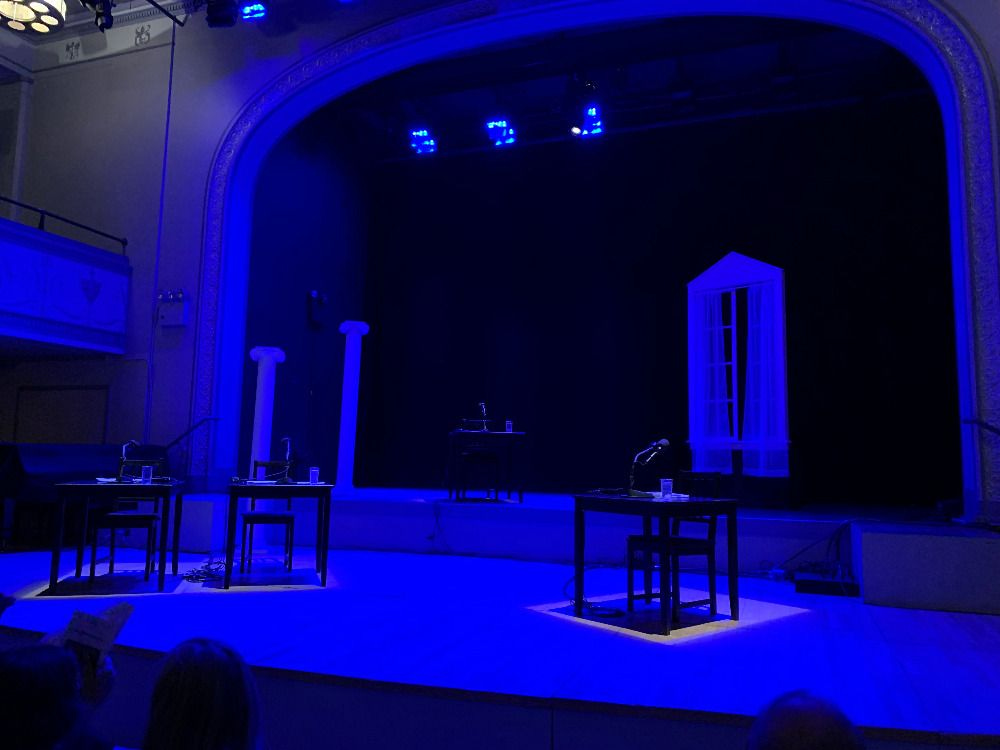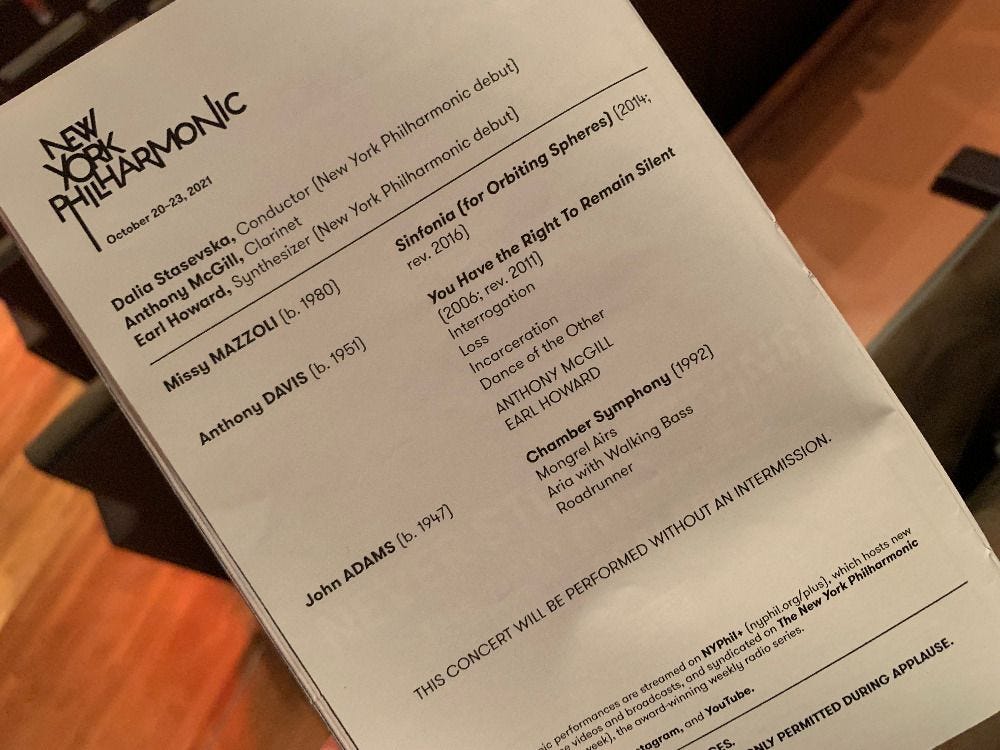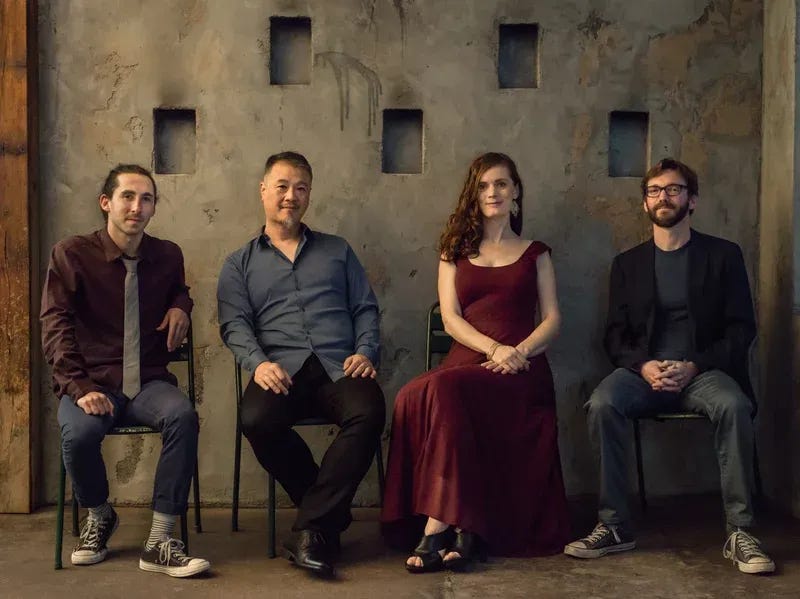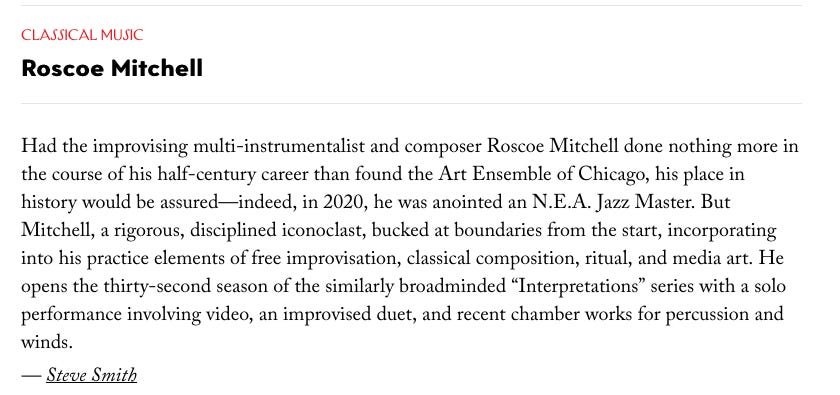Across a crowded room.
Timely reminders about why we go hear music played in public spaces… and a solid fistful of events you can catch yourself, starting tonight.
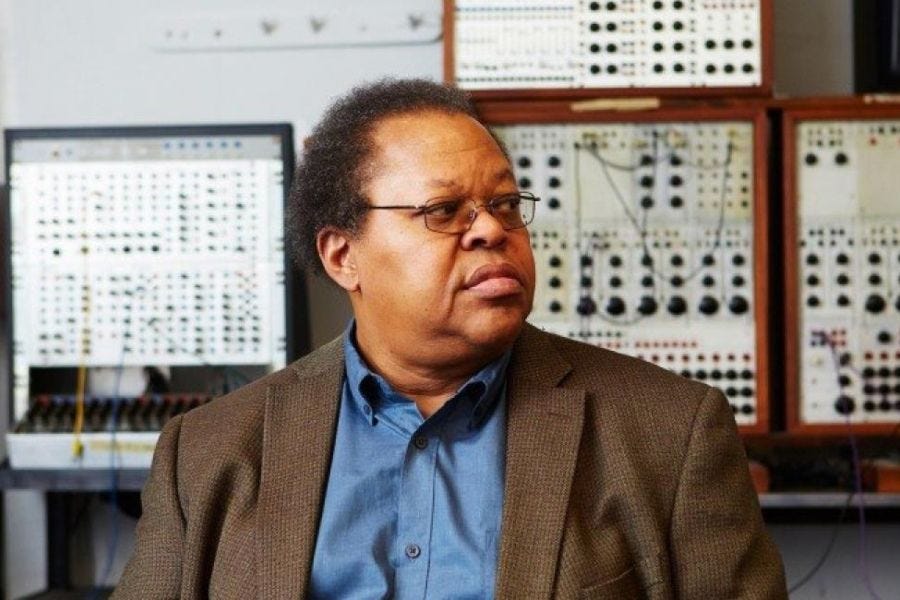
Prelude.
Two sensational live-music outings last week served as excellent reminders of why I do this thing that I do, and why maybe you do, too—or should. I don't mean writing about music (though maybe I do… see below in Here is the news.), but rather why it feels so neccesary that we congregate to encounter and experience music together, and why, despite our trepidation, we're so eager and grateful to have the opportunity again, finally.
Attending the new revival of Robert Ashley's chamber opera eL/Aficionado at Roulette a week ago was the marvel I'd anticipated, with superb performances by vocalists Kayleigh Butcher, Bonnie Lander, Brian McCorkle, and Paul Pinto, and sumptuous orchestrations by Tom Hamilton, much as they'd sounded on the newly issued cast recording. David Moodey's intelligent lighting and efficient staging, based on the original design by Jacqueline Humbert, enhanced the experience of being present as these performers executed their tasks. (Joshua Barone wrote a perceptive account for The New York Times, should you crave more detail.)
But the joy of being among others to respond, viscerally, to the work's flowing melodies… of hearing my unknown neighbor chuckling under her breath at the same robot-harmony real-estate babble that was making me laugh… of feeling immersed in the warm ovation at the conclusion: these, you begin to recall, are vital parts of attending performing-arts events.
That, and I got to spend a few moments afterward chatting with Thomas Buckner, who created Ashley's Agent role. (If you read me regularly, you know how much that opportunity meant.)
Again and again as I watched and listened to the New York Philharmonic play an all-contemporary program at Alice Tully Hall last Saturday night, I recognized it was one of the most thrilling things I'd ever heard the Phil do. The pieces were all familiar from recordings, and although I'm not wholly positive, I'd probably heard the Chamber Symphony by John Adams in person previously. (I really do miss the comprehensive list of every concert I'd ever attended since high school, which I lost in a hard-drive calamity around 20 years ago.)
I had the great privilege of writing a program note for Missy Mazzoli's Sinfonia (for Orbiting Spheres) when it was performed at the BBC Proms in 2017, so I knew what the piece was made of. Still, that didn't prepare me fully for the voluptuous depth and dispersion intrinsic to the work's cosmic architecture, or the magical way harmonicas insinuated through the orchestra float like breath within the orchestral textures. It's exciting to hear the Philharmonic do this piece—and exciting, too, to know Yannick Nézet-Séguin and the MET Orchestra will bring it to Carnegie Hall in June, on a big ol' bill with a luxury-cast Act I of Die Walküre.
Honestly, it shouldn't have taken a decade and a desperate season of social upheaval to bring Anthony Davis's You Have the Right to Remain Silent into the Philharmonic repertoire. But we can be grateful it arrived at a time when the orchestra has in Anthony McGill exactly the right clarinetist to bring this vivid, frequently livid concerto to life. The ensemble did justice to the work's variable moods and shouted (literally) asides—and what a marvel it was to see Earl Howard, brightly bedecked and barefoot, playing the essential digital sampler part for his Philharmonic debut.
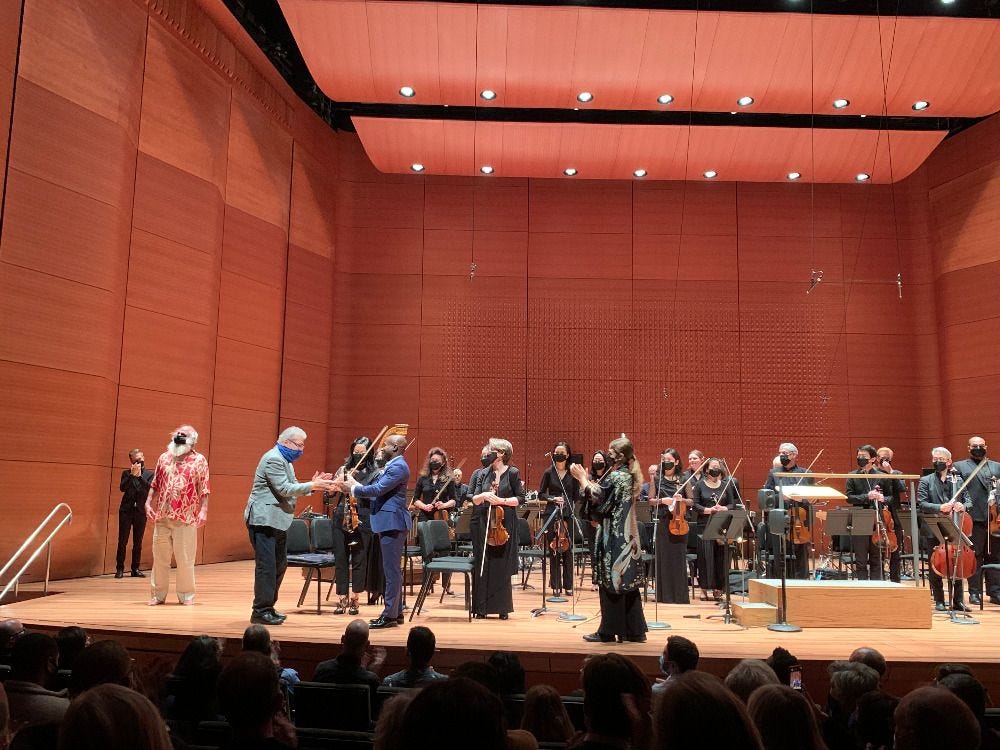
Chamber Symphony is a piece I've always respected and admired, but don't love in the way I do so many other Adams pieces. Here, though, was fierce advocacy, rhythmic assurance, and dynamic presence that couldn't be denied. You could only marvel at the playing the orchestra provided for conductor Dalia Stasevska, also making her Phil debut.
I had a single ticket for the concert, but met a musician friend who had a spare ticket, and accepted her invitation to relocate. This was exactly the right move. There's nothing wrong with attending a concert alone; I do it all the time. But the opportunity to share this event – to see my friend's elation at things that made me feel the same way; to see her caught up physically in the music's sway just as I was; to appreciate her just-audible murmurs of approval, rather than feeling sheepish about my own – was another powerful reminder of the communal experience a concert provides to anyone willing to venture out and participate.
I often wax enthusiastic about this or that George Grella essay, only to note that most of his content is reserved for paying subscribers. George's review of this concert, published by New York Classical Review, is free to all readers. Happily, so is a more sharply pointed Kill Yr Idols essay spun out from the same event…
What I don't get is that American classical music institutions constantly fret about getting new, younger audiences and, year in and year out, don’t do the most obvious things to make that happen. The Philharmonic's concert of Missy Mazzoli, Anthony Davis, and, yes, even John Adams, was something any listener could easily enjoy with no introduction whatsoever. That’s because those composers live in the same world we do. Yes, sometimes it's that simple.
You should watch the videos George thoughtfully embedded, including one I'd not seen before: a Stony Brook Symphony Orchestra performance of Sinfonia (for Orbiting Spheres) conducted by the late Michael Morgan, a great artist and leader, and a friendly colleague whose presence I miss very much.
Here is the news.
Stories that sing. In a newsletter last week, I mentioned a story by my colleague Chloe Veltman, forthcoming for radio and the web, about the Del Sol Quartet collaborating with composer Huang Ruo and the San Francisco vocal ensemble Volti in the world premiere of a new chamber oratorio, Angel Island. The story aired on Friday morning, and you can read and hear it now on the NPR website. And don't forget, the quartet has a beautiful recording of another Huang Ruo piece, A Dust in Time, out now on the Bright Shiny Things label.
Everyone's a critic. After taking 2020 off for the same reason the rest of the world did, the Rubin Institute for Music Criticism will return June 16-20, 2022, at the San Francisco Conservatory of Music. In years past I've had the pleasure of working with several of the institute's winners and alumni, including A.Z. Madonna, Lucy Caplan, Jennifer Gersten, brin solomon, and Samantha London.
What's new this year is that, for the first time, I'll be participating as part of the faculty writers panel, alongside a stellar group of friends and colleagues. The program is designed primarily for current college and graduate school students, but is open to recent graduates as well. And, evidently also for the first time, Canadian applicants are welcome.
The application deadline is January 31, 2022; you'll find more details on the institute's website. (Me, I'm feeling badly out of touch with writing criticism for an editor on a deadline… so I'm addressing that, soon. Watch this space.)
Turtle streams. Lingering in the Bay Area a moment longer, the great composer, singer, and choreographer Meredith Monk is set to unveil a new work, Indra's Net, in concert performances on Nov. 12 and 13 at Mills College in Oakland. The evening-length piece, inspired by a Buddhist/Hindu myth about the fundamental interconnection of everything, is the third part of a trilogy begun with On Behalf of Nature (2013) and Celular Songs (2018). Limited in-person seating is available to those who might be nearby. For the rest of us, the performances will stream live, free of charge, on the Mills College website… more details here.
Night After Night Watch.
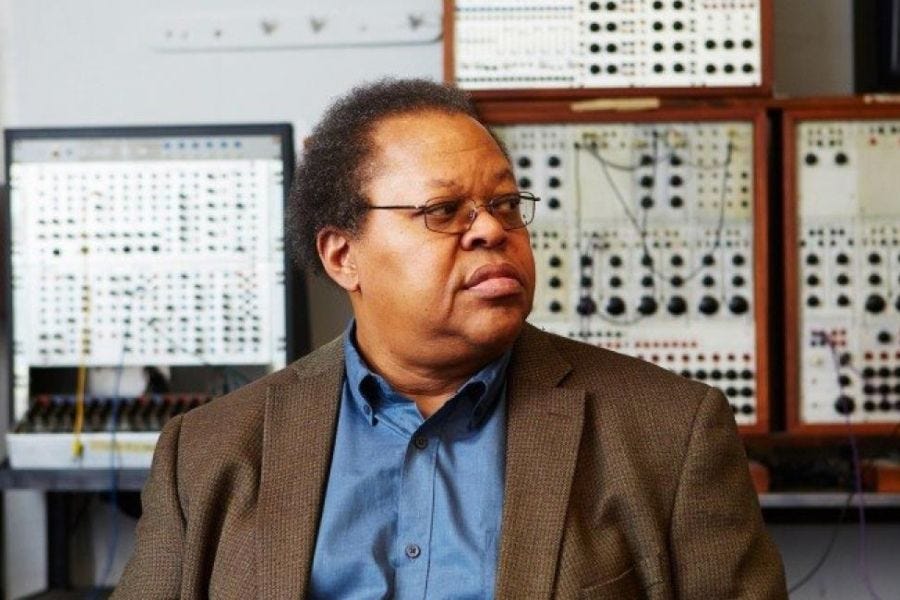
All events listed in Eastern Standard Time. Unless otherwise noted, presume that proof of vaccination is required.
28
Chamber Music Society of Lincoln Center
Rose Studio, Lincoln Center
165 W. 65th St., 10th floor, Upper West Side
Thursday, Oct. 28 at 7:30pm; $35
chambermusicsociety.org
The first program in the Chamber Music Society of Lincoln Center series New Milestones, which concentrates on modern and contemporary works in an appropriately intimate setting, features an enticing slate of works by Marcos Balter, Shih-hui Chen, George Lewis, Alexandre Lunsqui, and Nina Shekhar.
28-30
Mary Halvorson
The Stone at The New School
55 W. 13th St, Greenwich Village
Thursday, Oct. 28–Saturday, Oct. 30 at 8:30pm; $20
thestonenyc.com
Thur: Duo with Jessica Pavone; Fri: Amaryllis with Adam O'Farrill, Jacob Garchik, Patricia Brennan, Nick Dunston, and Tomas Fujiwara; Sat: Trio with Nick Dunston and Henry Mermer
28
Interpretations: Roscoe Mitchell
Roulette
509 Atlantic Ave., Brooklyn
Thursday, Oct. 28 at 8pm; $20
Proof of vaccination required
roulette.org
The 32nd season of Thomas Buckner's invaluable new-music series begins with a showcase for A.A.C.M. mainstay and Art Ensemble of Chicago patriarch Roscoe Mitchell, who presents a solo-saxophone piece with video, a duo with percussionist Tani Tabbal, a vibraphone piece (Sunrise on an Ice Moon) played by Anna Wray, and Cutouts for Wind Quintet.
Here's my New Yorker Goings On About Town listing:
29
George Lewis
Flamboyán Theater at The Clemente
107 Suffolk St., Lower East Side
Friday, Oct. 29 at 8pm; $25
issueprojectroom.org
Speaking of the A.A.C.M. (in the listing immediately above, in case you missed it), another major creative figure from that nonpareil collaborative, George Lewis, is the focus of a program mounted by Issue Project Room at the downtown venue more commonly known as the Clemente Soto Vélez Cultural and Educational Center. The concert features performances by flutist Laura Cocks, cellist Seth Parker Woods, bassoonist Dana Jessen, and String Noise, the duo of violinists Conrad Harris and Pauline Kim Harris, all performing Lewis's uncanny music for instruments with active electronics.
31
GatherNYC
Museum of Arts and Design
2 Columbus Circle, Manhattan
Sunday, Oct. 31 at 11am; $25
gathernyc.org
This casual, welcoming Sunday-morning series, curated by cellist Laura Metcalf and guitarist Rupert Boyd, offers a wide span of appealing sounds. This weekend, flutist Alex Sopp and singer, songwriter, and violinist Christina Courtin team up for a program of solos, duos, and songs by Courtin, Béla Bartók, Reena Esmail, and Valerie Coleman.
1
Music Mondays
Advent Lutheran Church
2504 Broadway, Upper West Side
Monday, Nov. 1 at 7:30pm; free admission
musicmondays.org
Appearing next in this generous free series are pianist Shai Wosner and the East Coast Chamber Orchestra (a.k.a. ecco), who come together in a program interspersing Brett Dean's Approach (Prelude to a Canon), Andrew Norman's Gran Turismo, and Michi Wiancko's Blue Bourée among canonical works by Johann Sebastian Bach. Advance reservations are available, but not required.
Read even more listings in Night After Night Watch: The Master List, detailing events for weeks to come, exclusively for paying subscribers.



